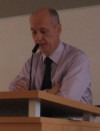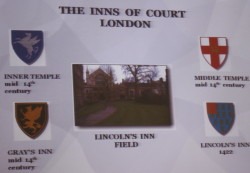 ’It seems to me by a casual observation that apparently, allegedly a codified legal system is incompatibile with an innovative society’, said Alan Stretton, Honorary Consul of Great Britain in Katowice, delivering the lecture entitled ‘Codified or Comon Law ?’.
’It seems to me by a casual observation that apparently, allegedly a codified legal system is incompatibile with an innovative society’, said Alan Stretton, Honorary Consul of Great Britain in Katowice, delivering the lecture entitled ‘Codified or Comon Law ?’.
 Alan Stretton, Honorary Consul of Great Britain in Katowice, delivered the lecture entitled ‘Codified or Comon Law ?’. The lecture was like a journey throughout the history, especially the history of law and its different legal systems. At the beginning Mr Stretton quoted Oscar Wild who described the actions of the House of Lords saying : ‘The Lords Temporal say nothing, the Lords Spiritual have nothing to say, and the House of Commons have nothing to say and says it’. Then he mentioned a few mile stons of British legal system : Magna Carta (1215), Bill of Rights (1689), Reform Act (1832), and the Act of Supremacy edited by king Henry VIII (1534) to : ‘visit, repress, redress, record, order, correct, restrain and amend any errors, heresies, abuses, offences, contempts and enormities’.
Alan Stretton, Honorary Consul of Great Britain in Katowice, delivered the lecture entitled ‘Codified or Comon Law ?’. The lecture was like a journey throughout the history, especially the history of law and its different legal systems. At the beginning Mr Stretton quoted Oscar Wild who described the actions of the House of Lords saying : ‘The Lords Temporal say nothing, the Lords Spiritual have nothing to say, and the House of Commons have nothing to say and says it’. Then he mentioned a few mile stons of British legal system : Magna Carta (1215), Bill of Rights (1689), Reform Act (1832), and the Act of Supremacy edited by king Henry VIII (1534) to : ‘visit, repress, redress, record, order, correct, restrain and amend any errors, heresies, abuses, offences, contempts and enormities’.
Anglo – Saxon model vs. Franco – German model
In the past in Anglo – Saxon model future lawyers were taught at the inns of court by fellows. In Franco – German model students were taught in universities where many of professors were clergy. Codified law is in force in the most European countries, all continental Europe. The system gives greater control from the center and greater state control of standards than common law which is still operative in Anglo – Saxon countries. Under a codified legal system you are guilty unless you have a piece of paper with a stamp on it (sic !) to prove you are innocent. Under common law, you are innocent until proven guilty.
How do the different legal systems affect business ?
Within the last 15 years in UK there were more legislation produced than in the previous 200 years. Government wants more and more monitoring. The problem is that a codified legal system seems to be incompatibile with an innovative society which demands different values. Just look at the data below.
World Bank Ranking ‘Ease of Doing Business’
1. Singapore
2. New Zeland
3. USA
4. Hong Kong / China
5. Denmark
6. UK
7. Canada
8. Ireland
9. Australia
10. Iceland
20. Germany
31. France
53. Italy
71. Kazakhstan
72. Kenya
73. Kiribati
74. Poland
Nobel Prize Winners
USA – 270
UK – 101
Germany – 76
France – 49
The Law and the Internet
Lawyers, bureaucrats and governments do not unterstand IT sector. All the intellectual property that is forming IT system and internet was built throughout many decades. A group of the greatest mathematicians of the twenthieth century needed decades to figure them out. One of them was Polish – professor Jan Łukasiewicz (1878 – 1956). He invented the Polish notation for the logical connectives in 1920s. This notation, known also as Polish notation, is the root of the idea of the recursive stack. It had a large field of implementation since it was much more efficient at managing large complex calculations with very little memory. Nowadays it is often used in stack – based and concatenative programming languages. It is also commonly used in dataflow, pipeline – based systems, including Unix pipelines.
So, professor Łukasiewicz worked in 1920s on the theory that is still in use after more than 80 yeras. The question arises : ‘What lawyer or bureaucrat could predict in the 20s how these theories would be used 80 years later ?’. None. Lawyers can only control after the event. They are not innovators. Neither bureaucrats who do not create jobs. They can only hire more bureaucrats. Scientists, engineers and businessmen have brilliant ideas. In a market economy it is companies and enterpreneurs who create jobs. Lawyers, the EU and European governments are to create a good, correct environment for job creation. At the end of his speech Mr Stretton explained that he was not trying to discreedit law. He found it essential and even more interesting than science because talking about legal and goverment system you can hardly prove whether you are right or wrong. Discussing work of bridge designer or mathematician which is accurate it is very easy to assume who is right, and who is wrong.
The Lisbon Agenda
The Lisbon Agenda was set out to make the European Union the most competetive business block in the world. The point is that they even cannot define the word ‘innovation’. Just like the Polish government.
Europe needs an innovation – friendly market for its businesses, the lack of which is the main barrier to investment in research and innovation. Not only more resources for R & D are needed, but also a paradigm change. European values should be preserved, but in a new social structure.
Maya Kowalczyk
Comment : In the past the law performed the function of a referee in a free economy. It applied generally accepted ideas of right and wrong to individual disputes. Today, law is more instrumental and therefore administrative.
English common law system originated in Middle Ages. Until 19th century was developed rather by judges than legislators. The legal systems now found in the United States and most members of the Commonwealth of Nations rooted in the English common law have developed, despite broad basic similarities, distinctive variations over time. Common law is also called Anglo – American law, but England and the United States have so many legal differences that they are sometimes described as ‘two countries separated by a common law.’
Maya Kowalczyk
